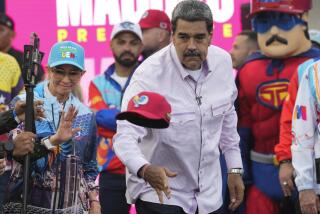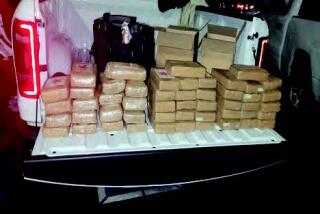Argentina Getting Serious in Money-Laundering Battle
- Share via
BUENOS AIRES — “Follow the money” has become the battle cry as Argentina confronts a money-laundering problem of considerable dimensions. And Argentine and U.S. authorities say the trail leads north through top U.S. banks.
In recent days the Argentine government has declared war on money laundering, creating a task force on financial crime and a legislative commission--whose leader is under police guard because of threats. If Argentina follows through on the offensive, it could shed light on multifaceted criminal activity that allegedly generated billions of dollars here during the 1990s.
Argentines are also learning that it takes two to tango: The flow of dirty money that originated here passed through the United States. The Argentine furor was sparked by a recent U.S. Senate report revealing the vulnerability of U.S. banks to international money laundering.
The probe by Democratic staffers of Senate permanent subcommittee on investigations focused on the correspondent relationship in which prominent U.S. banks provide services, accounts and credit to foreign banks. That setup gives small, sometimes dubious, offshore banks direct access to the U.S. financial system and the ability to move funds around the globe.
“U.S. banks fail to adequately screen and monitor foreign banks as clients,” the Senate report concluded. “The result of these due diligence failures has made the U.S correspondent banking system a conduit for criminal proceeds and money laundering for both high-risk foreign banks and their criminal clients.”
The Senate probe examined two emblematic cases in Argentina.
The backdrop is the high-rolling 1990s, when President Carlos Menem threw open Argentine markets, privatized industries and slashed regulation and bureaucracy.
In what has become a familiar story in the region, however, the free-market fiesta had a dark side. Lower tariffs were accompanied by big-time smuggling. Massive privatizations allegedly involved multimillion-dollar kickbacks. Foreign corporate investors were joined by Latin American drug lords, Middle Eastern arms dealers and the like.
Money laundering boomed, according to Argentine legislator Franco Caviglia, a veteran anti-corruption crusader.
“This phenomenon grew during the 10 years of the Menem government,” Caviglia said. “Money laundering is the final stage in which the product of criminal activity returns to the formal market. It benefited from structural, systematic corruption.”
The center-left government that took office in late 1999 passed a law against money laundering but has not fully implemented it.
Menem denies wrongdoing, though one of his former Cabinet ministers has been jailed and another is under investigation. Also under investigation is Raul Moneta, a politically connected banker.
Argentine and U.S. investigators suspect that Moneta had ties to the Bahamas-licensed Federal Bank, which was singled out by U.S. Senate sleuths as a classic “shell bank”: an institution that exists only on paper and moves funds of suspicious origin.
Moneta denies the allegations. But the Senate report states that Citibank had a 10-year correspondent relationship with Federal Bank, as well as Moneta’s Argentina-based Banco Republica.
Reflecting a U.S. banking culture with weak safeguards, the Citibank official in charge of dealing with both banks was surprised to discover that, despite their claims to the contrary, neither bank had safeguards against money laundering, according to the Senate report.
Similarly, the report asserts that Citibank did not adequately scrutinize a Cayman Islands bank that an Argentine financier allegedly used to launder money for a Mexican drug cartel.
Officials from Citibank and other U.S. banks will testify at hearings in Washington early next month and have already assured Senate officials that they are trying to prevent money laundering, according to Linda Gustitus, the subcommittee’s chief counsel.
Gustitus said the United States has the means to close the gateway to money laundering. Sen. Carl Levin (D-Mich.) plans to propose legislation directing U.S. banks to end their lucrative but risky business with offshore banks.
More to Read
Sign up for Essential California
The most important California stories and recommendations in your inbox every morning.
You may occasionally receive promotional content from the Los Angeles Times.










